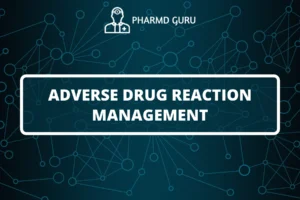ESTABLISHING A DRUG INFORMATION CENTER:
In the healthcare landscape, access to reliable and up-to-date drug information is crucial for healthcare professionals, patients, and caregivers. To meet this need, many healthcare institutions and organizations establish Drug Information Centers (DICs) dedicated to providing accurate, evidence-based drug information. In this article, we will explore the importance of establishing a Drug Information Center and discuss key considerations for its successful implementation.
SCROLL DOWN TO THE BOTTOM OF THE PAGE FOR ACTUAL NOTES
TABLE OF CONTENTS:
- Introduction
- Role and Importance of a Drug Information Center
- Planning and Resources
- Staffing and Expertise
- Information Management
- Collaboration and Networking
- Promoting Accessibility
- Quality Assurance
1. Introduction
A Drug Information Center serves as a centralized hub for gathering, analyzing, and disseminating drug-related information to support safe and effective medication use. It plays a vital role in promoting medication safety, improving patient outcomes, and supporting evidence-based decision-making by healthcare professionals.
2. Role and Importance of a Drug Information Center
A Drug Information Center serves multiple purposes, including:
- Providing accurate and evidence-based drug information to healthcare professionals, patients, and caregivers.
- Assisting in the identification and management of drug interactions, adverse drug reactions, and medication errors.
- Supporting healthcare professionals in making informed decisions regarding medication selection, dosing, and monitoring.
- Promoting rational drug use and adherence to treatment guidelines.
- Contributing to medication safety initiatives, such as medication reconciliation and pharmacovigilance.
- Facilitating research and education by providing access to drug literature, clinical guidelines, and research resources.
The establishment of a Drug Information Center demonstrates a commitment to patient safety, quality care, and evidence-based practice.
3. Planning and Resources
Before establishing a Drug Information Center, careful planning is essential. Consider factors such as the scope of services, target audience, available resources, and institutional support. Develop a strategic plan outlining the objectives, structure, and services of the center. Allocate adequate physical space, equipment, and technology infrastructure to support the operations of the center.
4. Staffing and Expertise
A well-qualified and dedicated team is crucial for the success of a Drug Information Center. Consider recruiting clinical pharmacists, pharmacologists, and other healthcare professionals with expertise in drug information and pharmacotherapy. Ensure that staff members receive ongoing training and professional development to stay updated with the latest developments in drug therapy and information management.
5. Information Management
Establish robust systems for managing drug information resources. Invest in electronic databases, subscription services, and access to reputable drug information sources. Develop standardized processes for literature search, evaluation of evidence, and the creation of drug monographs or guidelines. Implement effective knowledge management strategies to organize and disseminate drug information efficiently.
6. Collaboration and Networking
Promote collaboration with other healthcare institutions, academic centers, and professional organizations. Establish partnerships to exchange information, participate in research projects, and share best practices. Engage in multidisciplinary collaborations to foster a holistic approach to medication management and patient care.
7. Promoting Accessibility
Ensure that the Drug Information Center is easily accessible to healthcare professionals, patients, and caregivers. Establish mechanisms for receiving inquiries, such as a dedicated phone line, email address, or an online portal. Implement a timely response system to address queries and provide accurate drug information. Develop patient-friendly educational materials and resources to empower patients in understanding their medications.
8. Quality Assurance
Maintain high standards of quality assurance in all aspects of the Drug Information Center’s operations. Implement processes for peer review, accuracy checks, and documentation of responses. Regularly review and update drug monographs and guidelines to reflect emerging evidence and changes in therapeutic practices. Seek feedback from users and stakeholders to continuously improve the services provided by the center.
ACTUAL NOTES




